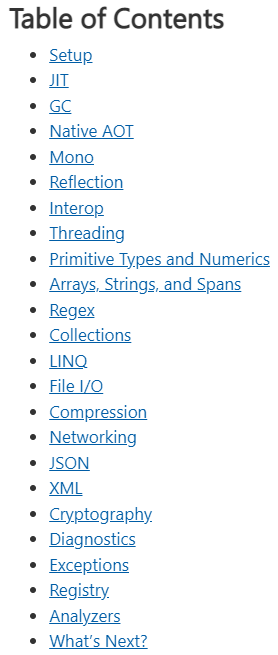Everything Anyone Could Possibly Want to Know About .NET 7 Performance Improvements
Here, I'll save you hours of time with a quick TL;DR: .NET 7 is fast.
But I come here not so much to talk about that, but the sheer size of the blog post announcing that.
Published today, Aug. 31, the post by Microsoft's Stephen Toub, "Performance Improvements in .NET 7," weighs in at more than 76,000 words, according to Microsoft Word. It must have taken me a couple minutes just to copy the thing to get a word count. I didn't time it; I just resolutely kept by finger down on the mouse button as I gritted my teeth and grimly came to terms with how long it was going to take to copy the text, scrolling through page after page after page, determined to finish the monumental, seemingly Sisyphean task. I thought Trump might be re-elected before I finished and could go out to vote. (Yes, later I realized I could have saved some time by clicking on the first word, holding the Shift key down and then clicking on the last word -- but I'm accustomed to the click-and-scroll method, which usually takes a second or two.)
I did time how long it took just to paste the text into Word for a word count: a good 16 seconds. To paste text.
"Whew! That was a lot. Congrats on getting through it all," said Toub toward the end. As if someone actually did. If you could read three words per second, it would take 6 to 7 hours to read (someone check my math on that -- I'm a journalist).
"Hi Stephen! Thank you for your great articles. I really enjoy reading this article -- although it will take me some time 🙂," said the first comment to the post.
"I swear there articles are getting longer every year but I love it. Didn't finish it all yet but great work!" read another comment.
All joking aside (for now), the dev team seems to have done a great job increasing performance in .NET 7, which will debut in November.
Toub exhaustively detailed improvements in 23 areas, ranging from Setup and JIT to Registry and Analyzers.
 Toub's Tome TOC (source: Microsoft).
Toub's Tome TOC (source: Microsoft).
He also improved on my TL;DR above (which I hadn't seen when I penned mine).
TL;DR: .NET 7 is fast. Really fast. A thousand performance-impacting PRs went into runtime and core libraries this release, never mind all the improvements in ASP.NET Core and Windows Forms and Entity Framework and beyond. It's the fastest .NET ever. If your manager asks you why your project should upgrade to .NET 7, you can say 'in addition to all the new functionality in the release, .NET 7 is super fast.'
As for what's next, Toub said: "The next step is on you. Download the latest .NET 7 bits and take them for a spin. Upgrade your apps. Write and share your own benchmarks. Provide feedback, positive and critical. Find something you think can be better? Open an issue, or better yet, submit a PR with the fix. We're excited to work with you to polish .NET 7 to be the best .NET release yet; meanwhile, we're getting going on .NET 8 🙂"
He might this very second be writing the .NET 8 performance improvement post in order to finish on time.
Posted by David Ramel on 08/31/2022